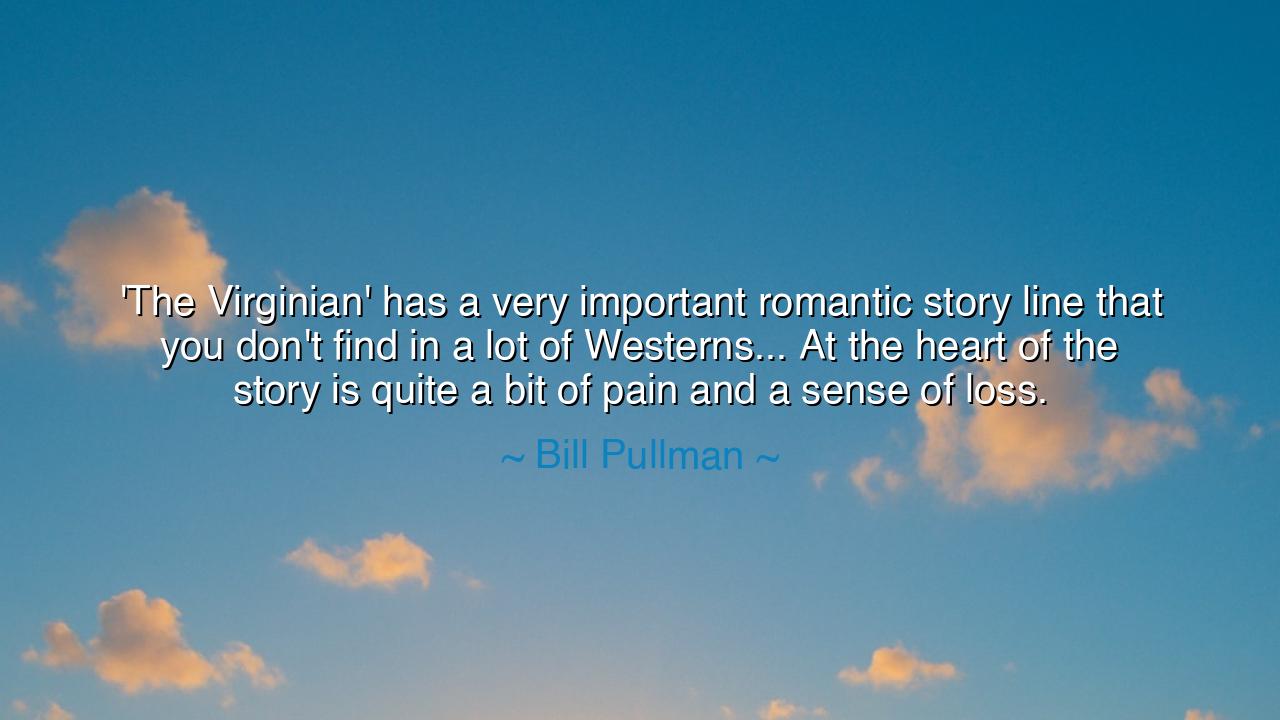
'The Virginian' has a very important romantic story line that you
'The Virginian' has a very important romantic story line that you don't find in a lot of Westerns... At the heart of the story is quite a bit of pain and a sense of loss.






Gather, O children of wisdom, and listen to the words of Bill Pullman, who speaks of the timeless tale of The Virginian. He once said, "'The Virginian' has a very important romantic story line that you don't find in a lot of Westerns... At the heart of the story is quite a bit of pain and a sense of loss." In these words, Pullman reveals the deeper truths that lie beneath the rugged, dust-filled surface of the Western genre—truths that speak not only to the physical struggle for survival but to the profound emotional journey that defines the human spirit.
The Western, with its iconic figures of cowboys, lawmen, and outlaws, has long been seen as a genre defined by its action, adventure, and the eternal battle between good and evil. It is a world of wide-open spaces, harsh landscapes, and an unyielding drive for justice. Yet, in The Virginian, Pullman reminds us that there is something deeper at play—a romantic storyline that is not just about love between two individuals but about the heartache, the sacrifice, and the loss that so often accompanies the human experience. The love in this story is not simple or idyllic, but rather it is woven into the fabric of pain and longing, a reminder that even in the most adventurous of tales, human emotions cannot be escaped.
This complexity mirrors the story of Achilles, that ancient hero whose greatness on the battlefield was defined not only by his strength and valor, but by his profound emotional turmoil. Achilles, though a mighty warrior, was haunted by the loss of his beloved friend Patroclus, and this grief drove him to the edge of his humanity. His desire for revenge was not just a fight for honor, but an attempt to fill the emptiness created by the loss of someone he loved deeply. In this, Achilles' story, like that of The Virginian, is one that speaks to the pain of love and the cost of losing what is most dear. The hero's journey is not just about external battles but about the internal battles we fight within our hearts.
In Westerns, we often find that the hero's journey is defined by physical struggles—fights, chases, and showdowns. But what Pullman highlights is the emotional depth beneath the violence and the heroic deeds. The heart of the story in The Virginian is not solely the thrill of the gunfight or the triumph of good over evil; it is the longing that the character feels for a love lost or unfulfilled, and the journey to come to terms with that loss. This, O children, is the essence of what makes the story truly human. In life, we are often faced with sorrow, with longings unfulfilled, and with moments of loss that seem unbearable. But it is in these moments, as in The Virginian, that we find the true strength of the human spirit—not in the absence of pain, but in the courage to carry on, to love despite the hurt, and to find meaning in the midst of suffering.
Consider, too, the story of Antigone, the daughter of Oedipus, whose heart was torn by the loss of her brother, Polynices. She defied the king’s orders and buried him, knowing that in doing so, she would face death. Her romantic love for her brother was not the love of affection, but the love of duty and sacrifice—a love bound by deep grief and sacrifice. In the same way, the love story at the heart of The Virginian is not just a simple romance, but a story of sacrifice, of navigating the pain that often comes with caring deeply for someone, and the loss that can accompany that love. Both Antigone and The Virginian carry with them the weight of emotional suffering, showing us that love is often entwined with pain, but it is through this very pain that we grow and find meaning in our lives.
And so, the lesson of The Virginian is clear, O children: Do not shy away from the pain that accompanies love, for it is in this pain that the depth of our humanity is revealed. In life, we will face moments of heartache and sorrow, but these are not signs of weakness. They are the crucibles in which our character is forged. Love, while bringing great joy, often carries with it the shadow of loss, and it is through embracing this that we find our true strength. Like the Virginian, we must learn to navigate both the joy and the sorrow of love, understanding that it is this complex interplay that makes us truly human.
So I say to you, do not fear the heartaches that life brings. For it is in the darkest moments of loss that we often find our greatest growth. Embrace the pain as part of the journey, knowing that it is through suffering that we gain the wisdom to move forward. Like The Virginian, let us carry with us the deep emotional truths that shape our lives—love, loss, and the courage to continue—for it is in this that we discover the fullness of life’s meaning.






AAdministratorAdministrator
Welcome, honored guests. Please leave a comment, we will respond soon